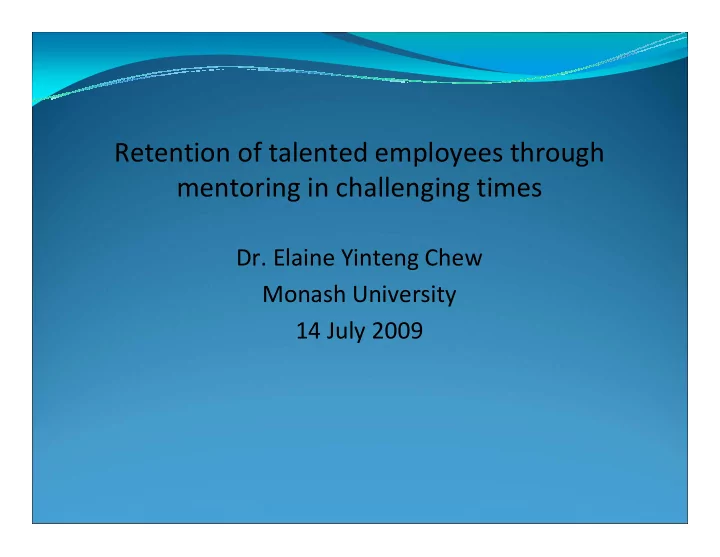

Retention of talented employees through mentoring in challenging times Dr. Elaine Yinteng Chew Monash University 14 July 2009
HR challenges � Malaysian workforce demand too much � Fresh graduate are too choosy, different values � High job ‐ hopping rate among Asia Pacific countries � Braindrain (JobStreet, 2005) Challenging task for HR department to attract and retain talented employees.
Service Industries Service is intangible End service is contingent on high degree of direct interaction High degree of absenteeism and turnover in the hospitality industry due to its characteristics (i.e., long hours, inflexible work shift, weekend time ‐ off) Challenge of managing human behaviors in enhancing organizational performance
HR countermeasure � Offer monetary attractiveness ‐ competitive pay, compatible to commercial pay � Offer non ‐ monetary attractiveness ‐ cafeteria benefits, various fringe benefits with flexibility ‐ training and advancement opportunities ‐ job enlargement and enrichment � Develop itself as a best employer and a great learning ground for career advancement ‐ MBA program, development program ‐ Succession planning for fast ‐ track promotion ‐ Mentoring
Training � Training is one of the many keys to gaining committed workforce � Investment on employees as corporate asset � Past research has found that: ‐ Training � Perceived Organizational Care � loyalty ‐ Training � Organizational Citizenship Behavior ‐ Training satisfaction � Perceived fairness � loyalty, pay satisfaction, Organizational Citizenship Behavior � Examples: ‐ Exxon Mobil, Johnson & Johnson, Unilever, P&G, Dupont
Training: Mentoring (1) � Historically, mentoring is an informal, unofficial, voluntary, mutually agreeable, and self ‐ selected interaction between mentor and protégé (informal mentoring). � In recent decade, mentoring has become a form of HR activities that indicates additional care or support (formal mentoring).
Training: Mentoring (2) � Mentoring is a leadership approach that breaks down hierarchical boundaries and influence people to achieve organizational and personal goals (i.e., individual growth, maturity). � A mentor is a senior and more experienced superior who (i) facilitates intentional learning, (ii) advises, counsels and (iii) enhances the career development of younger and relatively inexperienced subordinates
Training: Mentoring function � Mentoring has extended roles different from typical training: ‐ (1) coach protégé on career development ‐ (2) provide social support ‐ (3) serve as a role model For instances: ‐ sponsoring protégé in work/learning assignment ‐ providing personal feedback concerning values and expectations (i.e., share personal scenarios & cases) ‐ enhance protégé’s exposure and promotional opportunities ‐ providing political support and protection at work ‐ enhancing social acceptance and personal friendship
Training: Mentoring benefits (1) � Positive effects of mentoring based on empirical research: ‐ Mentoring � commitment � loyalty ‐ Mentoring � knowledge sharing ‐ Mentoring � organizational citizenship behavior ‐ Mentoring � productivity
Training: Mentoring benefits (2) � Mentoring experienced by MNCs reported: ‐ Mentoring leads to faster familiarization for new hires ‐ Mentoring leads to better culture fit ‐ Mentoring leads to cost saving (i.e., recruitment, fit) ‐ Mentors receive recognition, experience self ‐ actualization ‐ Mentoring helps fast track talented employees’ career ‐ Protégés receive the technical, organizational and cultural education needed to perform, and learning opportunities to excel
Mentoring: Organizational characteristics � Organizations that embrace mentoring as a strategic tool to retaining talented employees tend to: ‐ see employee development as a key element of strategy and corporate asset ‐ passionate about training and take mentoring seriously ‐ focus “growth from within” � long ‐ term performance advantage, retention tool ‐ be clear about the employee competencies and qualities that matter (i.e., talent search from within, succession planning, early career process)
Mentoring: Promising but beware of potential pitfalls � Mismatch between mentor and protege: ‐ level of respect, admiration, friendship, trust ‐ level of comfort, work styles, value systems � Unclear and unrealistic expectation: ‐ eagerness to learn, absence of clearly defined learning objectives � high expectation towards mentor ‐ unclear about mentor’s role as a facilitator and promoter of intentional learning � Psychological breach/violation of trust & confidentiality: ‐ level of trustworthy � Poor link between mentoring effort and organizational recognition
Mentoring: Activities and Exchange of ideas � Self ‐ assessment exercise � Q & A
Recommend
More recommend